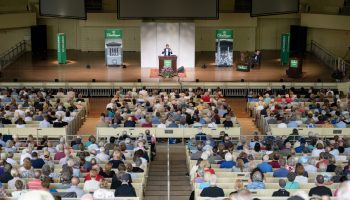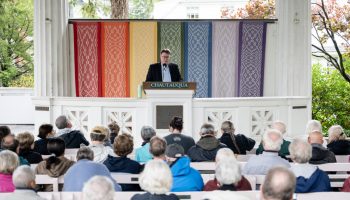The Rev. James H. Evans Jr. grew up in Detroit where “music is everywhere.” The city’s public schools had robust music programs, and Evans started playing music in third grade.
“I started with the clarinet, but I switched to saxophone because I thought girls would notice me more if I played the saxophone,” Evans said.
At 2 p.m. August 24 in the Hall of Philosophy, Evans will give a lecture titled “The Ambivalent Gospel of Motown,” also the title of his forthcoming book. He will address the music, religious and cultural politics of Detroit, focusing on Motown’s significance to the city’s religious institutions.
“The lecture is part personal memoir and part academic investigation,” Evans said. “But it really explores, I think, this very significant period of time in American music that is signified by the [depth] of the Motown recording company.”
Evans grew up with plans of working in the corporate world. But with a father, grandfather and great-grandmother who were ministers, he said the cards were stacked against him doing anything else from the beginning.
Evans felt his call to ministry while in college at the University of Michigan while involved in a student movement called the Black Action Movement (BAM). With BAM, Evans worked to increase the number of African-American students at the university, and also to better their academic experiences.
But when he felt called toward a religious vocation, Evans was unsure whether he could balance ministry with this growing appreciation for his cultural identity.
The book Black Theology and Black Power by James Cone changed Evans’ perspective, making him realize he could pursue social justice activism through a life of ministry. Evans served as president of Colgate Rochester Divinity School/Bexley Hall/Crozer Theological Seminary from 1990 to 2000, and currently works as both a pastor and as the Robert K. Davies Professor of systematic theology at Crozer. Divinity School.
In 2015, Evans was consecrated as Bishop Designate in The Kingdom Council of Interdependent Christian Churches and Ministries. Evans said it’s unique to have someone raised in the Baptist tradition, such as him, serve in Episcopalian office.
“My calling in that particular area is not to oversee churches. My calling is to basically help the Kingdom Council with its worldwide educational outreach programs,” Evans said. “The Kingdom Council has member churches throughout the U.S. and in various parts of the world, including Africa, … so it sort of flows out of my whole lifelong vocation as an educator.”
But music has been one of Evans’ passions throughout his entire life, from when he started playing clarinet (and saxophone) as a kid, to his experience as an amateur jazz musician today. He recently wrote two forthcoming books that discuss the origins of Motown and its relationship with religious communities.
Evans said music is a very significant part of any cultural and religious life in Detroit. He will address music, specifically Motown, in his lecture, hoping to give Chautauquans a new understanding of the Motown sound.
“To really understand [Motown] fully, and to appreciate it fully, one has to understand the context out of which that music emerged,” Evans said. “The vibrant context: The context of struggle, the context of victory, of the strained race relations in Detroit and the sort of emergence of a strong black community presence, really are the things that fuel that music, and I think what gives it staying power.”





